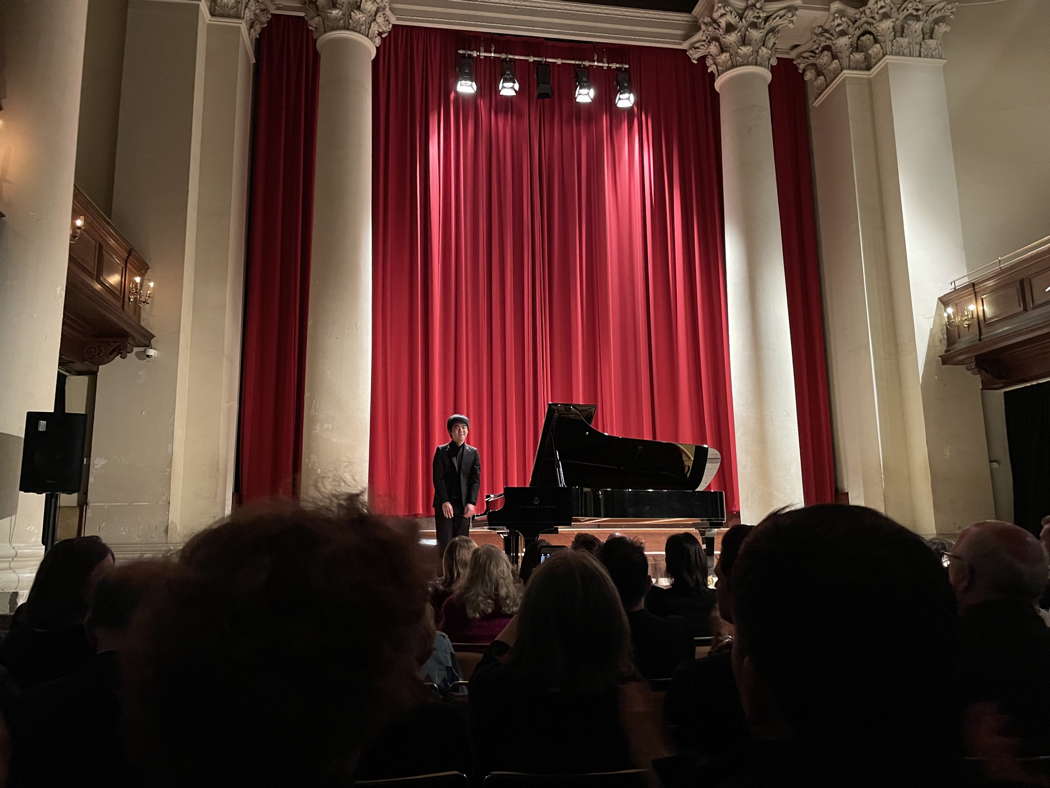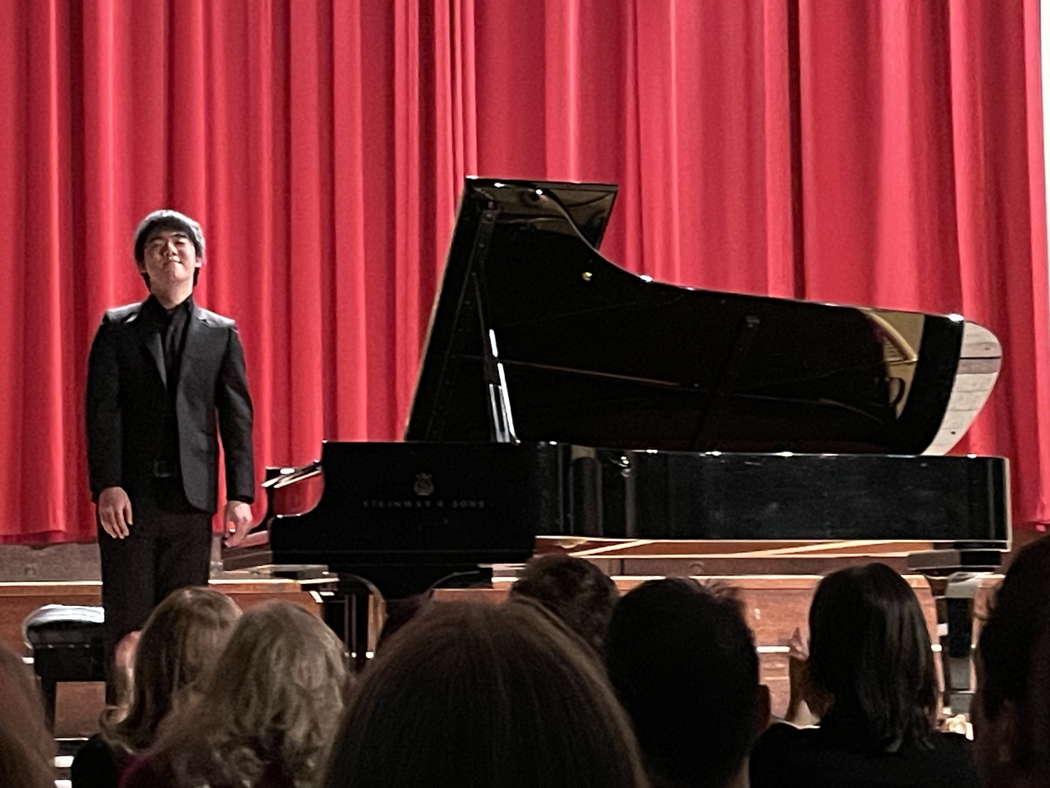 UPDATES: There's a new feature every day at Classical Music Daily. Read about the various ways we can keep in touch with you about what's happening here.
UPDATES: There's a new feature every day at Classical Music Daily. Read about the various ways we can keep in touch with you about what's happening here.
An Uncanny Cool and Relaxed Demeanour
MALCOLM MILLER is impressed by the London recital of young Chinese-Canadian pianist Kevin Chen
Cheers and ovations and two encores give some indication of the enthusiasm of the near-capacity audience at Kevin Chen's recital at St John's Smith Square, London, UK, on 15 October 2023. Chinese-Canadian Chen was the Gold Medalist at this year's Arthur Rubinstein International Piano Master Competition, held in March 2023 in Tel-Aviv, Israel, and at the tender age of eighteen, his pianistic talent is no less than phenomenal. Already winning several major prizes including the 2021 Liszt Competition and the 2022 Concours de Genève, he sports a superb technique and interpretative maturity beyond his years.

Kevin Chen at St John's Smith Square in London. Photo © 2023 Bobby Chen
This London concert, promoted by the UK Friends of the Arthur Rubinstein International Music Association, the first of a string of international appearances including at Carnegie Hall and in Australia, gave us a foretaste of an exciting career in the making. Indeed, he joins an impressive roster of international soloists who have won the award since the triennial competition's formation some fifty years ago, including Emmanuel Ax (1974), British pianists Ian Fountain and Benjamin Frith (1989), Kirill Gershtein (2001), Daniil Trifonov (2011), and, most recently, Juan Pérez Floristán (2021).
In his intelligently chosen programme involving technical wizardry and searching musicality, Chen dazzled with a sparkling virtuosity redolent of great pianists such as Shura Cherkassky, coupled with an intensity of expression fueled by subtle use of rubato and dynamics, dynamism and the energy and sincerity of youth. To open was Mendelssohn's Prelude and Fugue in B flat, Op 35 No 6, in which finesse in the left hand motifs underpinned the Prelude's rich harmonies, with echoes of characteristic Mendelssohnian scherzos in the flickering frothy fugue, each voice beautifully shaded with textural lucidity.
More intense expression emanated in the same composer's Variations sérieuses, Op 54, a thrilling account of which abounded in fleet-fingered delicacy and crystalline articulation in fast variations contrasted by powerful intensity in slow poetic variations, Chen lingering over single notes and harmonies shaded with almost operatic colour.
Here, and in the Chopin 12 Études Op 10 that followed, one could savour a pianistic touch that hovered and glided effortlessly across the keyboard, taking fast movements at super-fast tempi, yet still engaging the listener with dramatic dynamics and contrapuntal clarity. For example, in the final bars of the C major study that opens Op 10 with its sweeping arpeggios projected with hardly any visible movement, Chen injected a subito piano of arresting effect. The second study sprung into motion at a pace that unusually transformed it into a 'flight of the bumble bee', whilst in the F major eighth study the cascading arpeggios were breath taking, left hand motifs ever buoyant beneath.
More significantly, alongside such astonishing agility, the slow studies were deeply pensive, touching that level of Chopinesque angst and yearning, evident in the melodic purity and passionate chromaticism of the E major third study and the mysterious slow motion effect of the highly chromatic E flat minor study. The 'Revolutionary' study that caps the set was conveyed with suitable fireworks, yet at a level seldom experienced, let alone from an eighteen-year-old!
Evidence of his more searching artistry emerged in the second half, in Liszt's Bagatelle sans tonalité and Scriabin's Sonata No 7 Op 64, works prophetic of twentieth century atonality and expressionism. Here Chen displayed an ability to layer texture and create evocative soundscapes, the Scriabin full of suspense and searching intricacy, a gripping drama of numinous intimacy and chordal extraversion in this ecstatic, extravagant sonic canvas. Occasionally one sensed a need for a more caressing touch, with warmer tonal resonance, qualities he has plenty of time to develop as he matures and gains in experience.
Chen concluded by proving himself a Lisztian of distinction, with scintillating shimmering delicacy in Les jeux d'eaux à la Villa d'Este, melodic clarity in its various registral guises, and orchestral colours in the Réminiscences de Norma, its sound tapestry interweaving bel canto lines, boisterous dances and rhetorical recitatives projected through a pianistic panoply of leonine potency and grace. Especially impressive was how throughout he retained an uncanny cool and relaxed demeanour whilst tackling even the most fearsome athletic keyboard pyrotechnics, also evident in two encores, Liszt's virtuoso arrangements of Schumann's Widmung and Frühlingsnacht.

Kevin Chen at St John's Smith Square in London. Photo © 2023 Bobby Chen
The recital as a whole gave the audience a rare privilege to witness a superstar talent at the cusp of its development. There was no doubting Kevin Chen's outstanding talent, which one hopes to hear much more of on concert platforms and in recordings in the near future.
Copyright © 17 October 2023
Malcolm Miller,
London, UK




